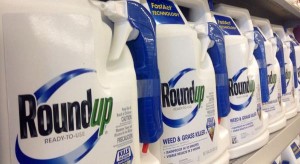EU-parlement voor nieuwe toelating glyfosaat. Wel steun voor verbod particulier en openbaar gebruik.
Het Europees Parlement is akkoord gegaan met een nieuwe toelating van het omstreden landbouwgif glyfosaat voor maximaal zeven jaar. Dat is korter dan de toelating van vijftien jaar die de Europese Commissie had voorgesteld. De Partij voor de Dieren pleitte voor een totaalverbod op glyfosaat. “Teleurstellend dat ook het Europees Parlement de winst van multinationals als Monsanto belangrijker vindt dan ons milieu en de gezondheid van mensen en dieren,” stelt Europarlementarier Anja Hazekamp.

“Dit gif is bijna niet te mijden en moet van de markt worden gehaald nu de veiligheid voor mens en dier niet kan worden gegarandeerd,” stelt Hazekamp. Voorstellen van de Partij voor de Dieren en GroenLinks om particulier gebruik en gebruik in openbare parken en speeltuinen te verbieden, kregen wel steun in het Europees Parlement.
Glyfosaat is het meest verkochte landbouwgif ter wereld. Het gif doodt onkruid in tuinen en wordt op grote schaal toegepast in de landbouw. De Wereldgezondheidsorganisatie waarschuwde vorig jaar dat het gif waarschijnlijk kankerverwekkend is. Mogelijk heeft het gif daarnaast een hormoonverstorende werking. Producent Monsanto en het dagelijkse Europese bestuur beweren echter dat het gif veilig is voor gebruik. De Europese Commissie had daarom een voorstel gedaan om glyfosaat opnieuw toe te laten voor de maximale termijn van vijftien jaar.
“Het wijdverspreide gebruik en de kankerverwekkende werking van glyfosaat zijn een gevaarlijke combinatie. Dit gif komt voor in rivieren, in grondwater en in ons voedsel. Onderzoek wijst uit dat de helft van alle mensen in Europa glyfosaatsporen in zijn of haar lichaam heeft. Veel mensen maken zich hier grote zorgen over, maar liefst twee derde van alle Europeanen wil een verbod op glyfosaat,” aldus Hazekamp.
De definitieve beslissing over glyfosaat ligt bij de 28 lidstaten van de Europese Unie. Zij stemmen half mei over het opnieuw toelaten van deze kankerverwekker. Frankrijk, Zweden, Italië en Nederland hebben zich tot nu toe uitgesproken tegen vernieuwing van de glyfosaat-toelating. Maar staatssecretaris Van Dam liet recent in een brief aan de Tweede Kamer weten onder voorwaarden toch te willen instemmen met een nieuwe toelating voor het gif.
The European Parliament has approved of the readmission of the controversial pesticide glyphosate for maximum seven years. That is shorter than the admission for fifteen years as was proposed by the European Commission. The Party for the Animals called for a total ban of glyphosate. “It is highly disappointing that the European Parliament finds the profits of multinationals such as Monsanto more important than our environment and the health of people and animals,” said MEP Anja Hazekamp.

“This pesticide is hard to avoid and must be taken off the market since the safety of people and animals cannot be guaranteed,” said Hazekamp. The proposals of the Party for the Animals and Green Left to ban private use and the use in public parks and playgrounds were supported in the European Parliament.
Glyphosate is the most sold pesticide in the world. The pesticide kills weed in gardens and is used on a large scale in agriculture. Last year, the World Health Organisation warned that the pesticide is most likely carcinogenic. Additionally, the pesticide may possibly be endocrine disruptors. But its producer Monsanto and the daily European government state that the pesticide is safe for use. The European Commission therefore made a proposal for the readmission of glyphosate for the maximum period of fifteen years.
“The widespread use and the carcinogenic effect of glyphosate are a dangerous combination. This pesticide is found in rivers, in ground water and in our food. Research has proved that half of all people in Europe have levels of glyphosate in their body. Many people are seriously concerned about it, as much as two-thirds of all Europeans want glyphosate to be banned,” according to Hazekamp.
The definitive decision about glyphosate lies with the 28 Member States of the European Union. They will vote on readmission of this cargogenic product in mid-May. France, Sweden, Italy and the Netherlands have objected to renewing the glyphosate admission until now. But State Secretary Van Dam recently informed the Lower House by letter that he wishes to agree to the readmission of the pesticide under certain conditions.